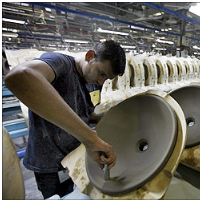Reform 09: Labour Laws to be Relaxed
 A factory with less than 300 workers would be allowed to lay off workers without government permission (file photo)
A factory with less than 300 workers would be allowed to lay off workers without government permission (file photo)
Prime Minister Narendra Modi is preparing to overhaul India’s tough labour laws in a bid to create millions of manufacturing jobs, even if it risks stirring up a political backlash that could block other critical reforms.
According to Reuters, the Labour Ministry is drafting a bill for the upcoming parliamentary session that proposes to loosen strict hire-and-fire rules and make it tougher for workers to form unions.
The changes, if approved by parliament, would be the biggest economic reform since India opened its economy in 1991, but it is likely to meet stiff opposition from opposition parties and labour activists.
The ruling NDA enjoys a majority in the Lok Sabha, but not the Rajya Sabha, hobbling the government's ability to pass politically contentious measures.
That handicap has stymied his efforts to make it easier for businesses to buy farmland and convert Asia's third-largest economy into a common market.
Rajiv Biswas, Asia-Pacific chief economist at IHS Global Insight, said the prime minister had little option but to push ahead with the measures.
"Without these reforms, the economy would stagnate, and frustrated investors would look elsewhere," he told Reuters. "You cannot make political opposition an excuse for not taking tough decisions."
Since taking office in May last year, Modi has taken a series of incremental steps to make labour laws less onerous for businesses, but fear of a union-led political backlash made him leave the responsibility for unshackling the labour market with Indian states.
His party's state governments in Rajasthan and Madhya Pradesh have taken the lead in this. Encouraged by a successful and peaceful implementation of the measures in those states, the labour ministry now plans to replicate them at the national level.
As part of the proposed revamp, a factory employing fewer than 300 workers would be allowed to lay off workers without government permission. Currently, factories employing 100 workers or more need approval for layoffs.
But they will have to pay three times the current severance package, the labour ministry officials said.
Companies have long been demanding an increase in the ceiling as governments rarely grant such permissions for layoffs, making it difficult to respond to business downturns. This has encouraged businesses to stay small or to hire temporary workers instead.
Some 84 percent of India's manufacturers employed fewer than 50 workers in 2009, compared with 25 percent in China, according to a study by consultancy firm McKinsey & Co.
"It will facilitate ease of doing business while ensuring safety, health and social security of every worker," a senior labour ministry official told Reuters.
The planned changes would also make it tougher for employees to form unions or go on strike, but would make all employees eligible for minimum wage.
The bill is expected to be finalised in the next three or four weeks, and then sent to cabinet for approval.
Manish Sabharwal, one of the brains behind Rajasthan's labour reforms and co-founder of recruitment firm Teamlease, said the central government should not attempt such reforms.
"Let states carry out these changes and save your political energy for other policy reforms," he said.
The World Bank says India has one of the most rigid labour markets in the world. That in turn has been a drag on manufacturing, which accounts for only 16 percent of India's $2 trillion economy, compared with 32 percent of China's.
To Learn More:
Modi to launch India's biggest labour overhaul in decades (by Rajesh Kumar Singh, Reuters)
Editorial: Working with dignity (Financial Express)
Modi’s ‘Make in India’ plan needs more labour market reform (by Pravakar Sahoo, The Conversation)
Shramev Jayate: Modi govt plucks some key low-hanging fruit for labour reforms (Indian Express)
Modi launches labour reforms to make doing business in India simpler (by Prashant K. Nanda, Mint)
- Top Stories
- Controversies
- Where is the Money Going?
- India and the World
- Appointments and Resignations
- Unusual News
- Latest News
- India College Chain’s Expansion into U.S. Draws Opposition from Massachusetts Officials over Quality of Education
- Milk Shortages in India Tied to Release of New Movies Featuring Nation’s Favorite Stars
- Confusion Swirls around Kashmir Newspaper Ban in Wake of Violent Street Protests
- Polio-Free for 5 Years, India Launches Vaccine Drive after Polio Strain Discovery
- New Aviation Policy Could Increase Service, Lower Ticket Prices






Comments